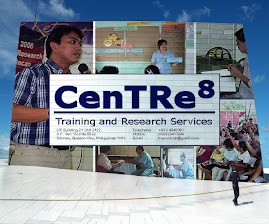Alexey Rola Cajilig (alexey.cajilig@gmail.com)
My reflection will focus on Robert Chambers' concept of responsible well-being and Corporate Social Responsibility.
I have a special interest on Corporate Social Responsibility or CSR. In fact I used to manage the national CSR campaigns of a multi-national pesticides company a few years back.
In the course of CSR implementation, I began to question our company's intentions when I realized that it was mostly public relations and sales-driven. The programs we painstakingly developed with communities (and "whole-heartedly" supported by top company executives) were abruptly put to a halt whenever shifts in buying patterns occur, and as public opinions improve. I feared that the unsustainable nature of such interventions, not to mention the co-opted strategies applied in hurried fashion, will have a negative impact on people especially i terms of genuine participation and commitment. At that time, I felt ill-equipped to face higher company personalities in debate over the issue. So I left the company in search for the real R in CSR.
CSR should adhere to the concept of responsible well-being. The value of giving more because you have more should be highlighted. More than that, CSR programs should ensure sustainable community livelihoods through participatory development and management.
CSR campaigns should not be geared primarily to gain customer loyalty and bottom-line sales. Instead, it must move towards the build-up of appropriate social services, complimentary with those provided by other organizations and the government.
After four years of searching, I am ready to answer the question - What is the R in CSR? The missing R in CSR is responsible well-being. With responsible well-being, grassroots programs will not result i the furtherance of a pervasive culture of dependence. Instead, it will eventaully result to real empowerment and considerable degree of economic independence. As a start, corporations may have to embrace the fact that they need to train CSR personnel in responsible well-being, and re-align programs towards this direction. In similar manner, community development institutions may have to unlearn certain biases towards business, and likewise embrace the role of paradigm-shift facilitators, consciously influencing corporate behaviours to help achieve a CSR with a real R.
Subscribe to:
Post Comments (Atom)



No comments:
Post a Comment